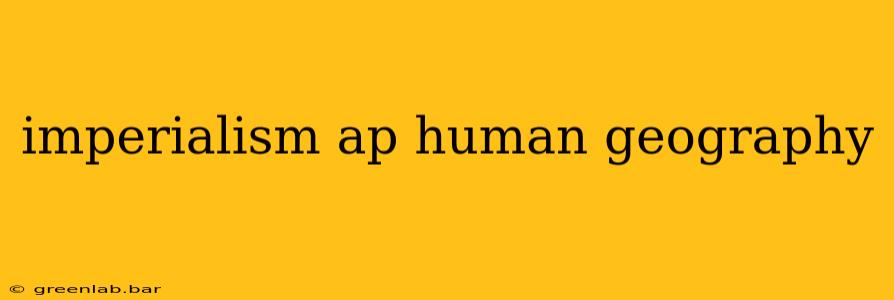Imperialism, a complex and multifaceted historical process, continues to shape the world we inhabit today. For students tackling this topic in AP Human Geography, understanding its nuances is crucial. This post will explore the various aspects of imperialism, from its driving forces to its lasting consequences, offering a comprehensive overview designed to enhance your understanding and improve your exam preparation.
Defining Imperialism: More Than Just Colonies
Imperialism isn't simply about establishing colonies; it's a broader concept encompassing the political, economic, and cultural domination of one territory or people by another. This domination can manifest in numerous ways, including:
- Direct Rule: The imposing of a colonial administration directly onto a subjugated territory. Think of the British Raj in India.
- Indirect Rule: Utilizing existing local power structures to govern a territory, often using puppet rulers or chiefs. This strategy was employed by the French in parts of Africa.
- Economic Exploitation: The systematic extraction of resources and labor from a colonized region for the benefit of the imperial power. This often involved the establishment of resource-extraction industries, such as mining or plantation agriculture.
- Cultural Hegemony: The imposition of the dominant culture's values, beliefs, and language on the colonized population, leading to cultural assimilation or suppression.
Key Drivers of Imperialism: A Multifaceted Analysis
Several factors fueled the expansion of empires during the late 19th and early 20th centuries:
- Economic Motives: The desire for new markets, raw materials, and investment opportunities drove many European powers to seek colonies. The Industrial Revolution increased the demand for resources, fueling this expansion.
- Political Motives: Competition between European nations for power and prestige played a significant role. The acquisition of colonies became a symbol of national strength and influence. This "Great Game" between Britain and Russia in Central Asia exemplifies this.
- Technological Advantages: Superior weaponry, transportation (steam ships), and communication (telegraph) allowed European powers to conquer and control vast territories.
- Ideological Justifications: Beliefs in racial superiority, the "civilizing mission," and the "White Man's Burden" were used to justify imperial expansion. These ideologies were deeply problematic and served to rationalize exploitation and oppression.
The Impacts of Imperialism: A Lasting Legacy
The consequences of imperialism are far-reaching and continue to shape the global landscape today. These impacts can be seen in:
- Political Boundaries: Many present-day national borders are a direct result of colonial divisions, often ignoring pre-existing ethnic and cultural boundaries. This has led to numerous conflicts and instability in post-colonial states.
- Economic Underdevelopment: Colonial exploitation often left former colonies with underdeveloped economies, dependent on the extraction of raw materials and lacking diversified industries. This neocolonialism continues to impact global trade imbalances.
- Social and Cultural Impacts: The imposition of European languages, religions, and cultural norms profoundly impacted colonized societies. While some cultural exchange occurred, it often came at the cost of suppressing local traditions and identities.
- Environmental Degradation: The exploitation of natural resources during the colonial era often resulted in significant environmental damage, contributing to long-term ecological problems.
Analyzing Imperialism in AP Human Geography: Key Concepts and Case Studies
When studying imperialism in the context of AP Human Geography, it's crucial to engage with key concepts like:
- Core-Periphery Model: Imperialism significantly contributed to the development of a global core-periphery structure, with core countries (former imperial powers) benefiting from the exploitation of peripheral countries (former colonies).
- World-Systems Theory: This theory examines the global capitalist system and its impact on unequal development, highlighting the lasting effects of imperialism on global power dynamics.
- Neocolonialism: The continuation of economic and political dominance of former colonial powers over their former colonies, often through indirect means.
Effective case studies for AP Human Geography include:
- British India: A prime example of direct rule, showcasing economic exploitation, cultural impact, and the legacy of partition.
- Belgian Congo: A stark illustration of brutal exploitation and the devastating consequences of unchecked imperial power.
- French Indochina: An example of indirect rule and the lasting impact of colonial policies on the region.
By thoroughly understanding the multifaceted nature of imperialism and its lasting consequences, you'll be well-equipped to succeed in your AP Human Geography studies and beyond. Remember to connect these concepts to contemporary issues of globalization, neocolonialism, and global inequality.

